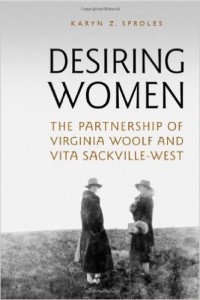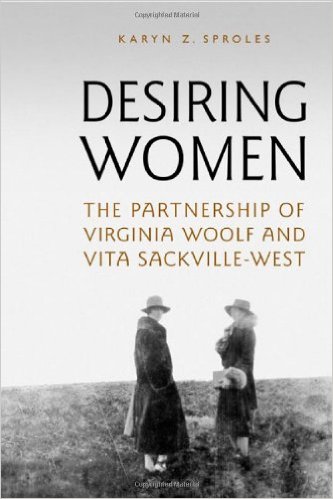 Desiring Women: The Partnership of Virginia Woolf and Vita Sackville-West
Desiring Women: The Partnership of Virginia Woolf and Vita Sackville-West
by Karyn Z. Sproles
University of Toronto Press. 166 pages, $29.95 (paper)
WITH DESIRING WOMEN, Karyn Z. Sproles adds to the large volume of criticism and analysis of Virginia Woolf’s work. Sproles’ focus is on Woolf’s relationship with Vita Sackville-West (1892–1962), an English poet and novelist with whom she had an affair in the late 1920’s. Her book explores the ways that both authors struggled to represent their desire for one another and to resist the social pressures that would force them to renounce their passion for each other. Evidence of their erotic desire can be found in the books they wrote and published during the most intense portion of their physical and emotional relationship, in which their influence on one and other was profound. Sproles invites us to integrate the two women’s sexuality with their published work (text and context) and regard desire as something greater than sexual desire alone, as something bound up with language—a language that then (and to a certain extent even now) does not accommodate erotic affections between two women.
When the two women met on December 14, 1922, Sackville-West, who had just published The Heir and Knole and the Sackvilles, was the more popular writer and had received a great deal of critical attention. Woolf was living at Bloomsbury at the time, and Sproles claims that “for all her aristocratic savoir-faire, Sackville-West was ten years younger than Woolf and completely out of her element.” Yet Sackville-West was a woman who ignored the conventions and expectations of society without suffering the consequences, upholding a vision of aristocratic life that she inherited from her grandfather, who lived in the family home, Knole, during her childhood. Ironically, it was what she couldn’t inherit that troubled her the most. In her family, lineage was important, and she “understood the consequences of both privilege and reproduction. She knew that her cousin Eddy, because he was male, would inherit Knole in her place.”
Woolf’s Orlando, published in the waning days of their affair, was a fictional biography of Vita Sackville-West. Instead of Orlando dressing like a man, as Vita sometimes did, Orlando becomes a man. Aphra Behn, Sackville-West’s fictional biography, was published a few months before Orlando. Both books blur the separation between fact and fiction. Orlando, a satire of a biography, includes in Sproles’ words “meticulous documentation, confusion over data, absence of evidence, quarrels with previous biographers, and the very nature of biographical research that structure Alpha Behn.” Orlando was closely followed by A Room of One’s Own, in which Woolf played with Sackville-West’s claim that a masculine nature and a powerful feminine side can in fact coexist, turning it into a theory of androgyny.
To support her innovative interpretation, Sproles deftly interweaves various types of material and threads of argument. She thus illuminates hitherto neglected aspects of both authors’ writing. I picked up my own copy of A Room of One’s Own and reread it again recently. I’d read it three times, so I felt I knew the book fairly well. But by placing it into the context of desire, seeing it with a fresh eye, and recognizing the profound influence of Vita Sackville-West, the book became a new and different experience.
____________________________________________________________________
Martha Miller’s latest book is Tales from The Levee (Southern Tier Editions, 2005).






